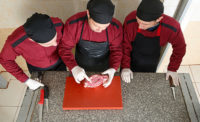SHOW PREVIEW
Knowledge Is Power
Education is the main goal of the Food Safety and Security Summit in Washington, D.C.
The best ways to protect food don’t start simply with sterilizing an area and keeping everything a safe temperature. Education is the first and best step to ensure food safety. Because of that, the largest focus of the 2008 Food Safety and Security Summit falls on education.
The learning begins March 17 at1 p.m. with half-day workshops. Each one involves a different and important aspect of food safety. All the education takes place at the Washington Convention Center.
“Food Safety — A Quality Management Systems Approach” will work to create a roadmap of food safety throughout the whole supply chain. It will use guidelines from both the American Society for Quality (ASQ)’s Economic Case for Quality and the real world. It will be led by Steve Wilson of the ASQ and the U.S. Department of Commerce, and Janet Raddatz of Sargento Foods Inc.
“The Global Food Safety Auditing Initiative,” led by Mark Overland, corporate certification manager at Cargill Inc., will focus on the effort to harmonize food-safety standards around the world. The workshop gives attendees a chance to discuss important issues in the area and talk with representatives from audit companies about their involvement.
Dr. Donald W. Schnaffner from the food science department at State University of New Jersey will present a workshop on “Challenges in Implementing HACCP: Validation, Verification and Recordkeeping.” The workshop will concern itself with the more advanced principles of HACCP, including validation, verification and recordkeeping. It will address more common problems encountered when companies try to implement these principles. Attendees are encouraged to bring their own HACCP plans or potential issues for discussion.
“Food Safety and the Importance of Harmonized Standards and Common Systems” looks at a common approach to food safety through international organizations such as CODEX and the World Organization for Animal Health (OIE). Joe Scimeca, director of regulatory affairs for Cargill, will lead this workshop.
The last half-day workshop is titled “Handwashing on Trial: Setting Standards. Changing Behaviors.” The workshop focuses on the most basic food-safety action and how failure to ensure its practice can cost companies. In this case, the session is a mock trial based on actual events. The leaders are Jim Mann, founder of Handwashing for Life Institute; William Marler, managing partner, and Denis W. Stearns, principal at Marler Clark LLP PS. Judge Mark Toscano will preside, and Gary Ades of G&L Consulting will be the jury foreman.
Each full day of the summit will feature shorter sessions covering all aspects of food safety and security. The seminars have been organized into five different tracks to help focus attendees’ education.
“In the Lab – Testing and Technology” has seminars that will focus on technologies and techniques to help participants improve their companies’ laboratory accuracy, efficiency and effectiveness. Some of the specific subjects covered include microbiology testing, analytical testing, rapid lab-testing methods and physical property analysis.
“Foodservice and Retail” will cover issues and topics concerning those who work in the non-commercial and restaurant arena. Subjects such as employee training and recruiting, HACCP for restaurants and retail, government regulations, and handling of raw materials will be covered.
“In the Plant” covers plant operations technologies and techniques to help participants improve the quality and safety of products. Sanitation and contamination control, sourcing of ingredients and the newest trends in the sector will be the focus of activities in the track.
“Food Security and Supply Chain” will cover subjects regarding the security of the entire supply chain, both domestically and globally. Serious issues such as bioterrorism, product tampering, vulnerability assessments, and transportation and storage will get attention during these sessions.
“Process Control and Quality Assurance” will tackle management procedures and technologies to help attendees improve overall food-production quality. Topics covered include HACCP validation and verification, statistical process control, traceability, and supplier programs and audits.
Throughout all the session periods, Summit attendees will also be able to see exhibitor-sponsored programming at the Vendor Track Theatre in the Summit Exhibit Hall. They also will be able to take advantage of the Summit’s new Posters and Papers Research Program March 18 to 19. Reviewed by a team led by food-safety expert Dr. Daniel Y.C. Fung, research posters will be on display throughout the Summit, featuring insights on important scientific findings.
For more information and details about the Food Safety & Security Summit, visit www.foodsafetysummit.com


Report Abusive Comment